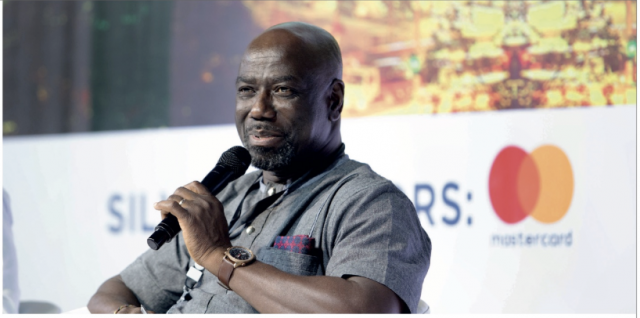Akwasi Awua Ababio was appointed in February 2017 as Director of the Diaspora Affairs Office of the President. He is responsible for overseeing the overall formulation and implementation of the Ghana Diaspora Engagement Policy. Mr Ababio also chairs the Year of Return’s steering committee.
What does the President want to achieve concretely with the Year of Return?
The Year of Return is an opportunity for Ghana to reconnect with the African-American and Caribbean communities so they can re-ignite their African identity. Four hundred years after Africans were sold into slavery, the US Congress passed bill H.R.1242 to commemorate the 400th anniversary of African-American history. Ghana wished to play an active part in this commemoration.
President Nana Akufo-Addo launched the ‘Year of Return, Ghana 2019’ in Washington D.C. in September 2018. The government of Ghana wants to be the flagship of Pan-Africanism, to lead the reunification of the historical African family with the continent. We will extend our traditional sense of hospitality to Diasporans and welcome them back to Africa.
What is the role of the Diaspora Affairs Office?
We act as facilitators for Diaspora members who set up businesses here. It is sometimes as simple as trying to get a business registered. Some need assistance to follow up on a process with a government agency. They get frustrated when they run into administrative roadblocks. The Office’s purpose is to assist the Diaspora in its contribution towards our national development.
What are the most efficient tools to engage the Diaspora and boost the development of Ghana?
Over the years, Ghana suffered a brain drain, as many of us left to live and work abroad. We went through all sorts of experiences and professional fields and contributed to our adopted host countries’ expansion. We plan to pursue what we call the ‘brain reverse’ as opposed to the brain drain that took place years ago. The goal is to plough back the expertise that people have acquired, to harnessthe network they have built. Ashesi University was created by a US-based Ghanaian, a former Microsoft employee, who imported his network of professionals and skill sets to Ghana.
Ashesi has become a foreign exchange earner because people come from the rest of Africa to further their higher education. It is a remarkable example of what we can achieve if we bring those skills back to the country. We have to put Ghana in people’s minds. It is a global village. Returning to Africa does not necessarily mean moving back. People can return with ideas, while still living in their host country. Their role consists of finding ways to foster Ghana’s development.

Can you tell us more about the Diaspora youth engagement initiatives conducted this year?
The President has visited top universities like Oxford, Cambridge, Princeton, Yale etc., where there are Ghanaians or Africans who can relate to us as a country. These visits are already bearing fruit, with some young Ghanaians planning to come back and contribute to our development. A high-tech summit took place recently. It was organised by recent graduates who had been working in the Silicon Valley.
The national service now welcomes youths from abroad. We are getting positive feedback from university students who are interested in working for companies here. Our programmes include jobs within a government agency or private agencies after students graduate from university.
Last year about 200 youths responded to this initiative. And numbers are going up. We receive daily enquiries at the Office of the Diaspora.
Some Diasporans have expressed a wish to actively participate in Ghana’s political life. How close are they to being allowed to vote or hold official positions?
Ghanaians have always had the right to vote, whether they have dual citizenship or not. We plan to set up a system whereby they can vote from their host country.
At the moment, the Constitution prevents Diasporans from holding elected offices, becoming the vice-chancellor of a university, a colonel in the Ghanaian army or a chief director in a ministry. At our last July conference, the President said he was prepared to take the issue to the legislative assembly for debate. We want dual citizens to play key roles in our national development.
THE OFFICE’S PURPOSE IS TO ASSIST THE DIASPORA IN ITS CONTRIBUTION TOWARDS OUR NATIONAL DEVELOPMENT.
Can you tell us about the Year of Return event calendar you created, attracting stars and giving visibility to the initiative?
The Year of Return started before January with the Full Circle Festival. Hollywood stars came to Ghana with their families. This ignited the whole idea of the Year of Return. Social media coverage exploded. CNN listed Ghana as the 4th-best place to visit. Ghana made headlines all over the world. Since January, we have held 80 events. Pre-existing festivals have now taken on the flavour of the Year of Return.
The anniversary of Ghana’s Independence was celebrated in Tamale instead of Accra. The usual parade of students, firemen, service men, market women etc. was accompanied by a Diaspora march. This shows the Diaspora’s integration with the national fabric and nation building.
The Homecoming event we organised in July attracted a high number of visitors and positive reviews. We also held the biennial Cape Coast Panafest festival, which had been going downhill for years. The Year of Return boosted participation as Diaspora members came from all over the world. The Chale Wote emancipation festival was a big success.
What will happen to the Year of Return after 2019?
The fire has been lit. All sorts of initiatives are in the pipeline for 2019 and beyond. They will be unveiled by year’s end.
Are there specific incentives for the Diasporans to come back?
Granting them Ghanaian citizenship is an incentive as investment rules are not the same for foreigners and nationals. Ghana offers peace and tranquillity. And we are growing faster than the rest of the world.
What is the way forward for Ghana’s engagement with the Diaspora after 2019?
We need to consolidate the gains we have registered in a short period of time and establish Diaspora Affairs as an institution. The first step is to get the Diaspora engagement policy passed. This will provide a framework to find the best way to mobilise the Diaspora for the benefit of the country.
This document is ready. Hopefully the President will launch it soon. It will go a long way to consolidate this institution and the efforts we have made so far.














Comments